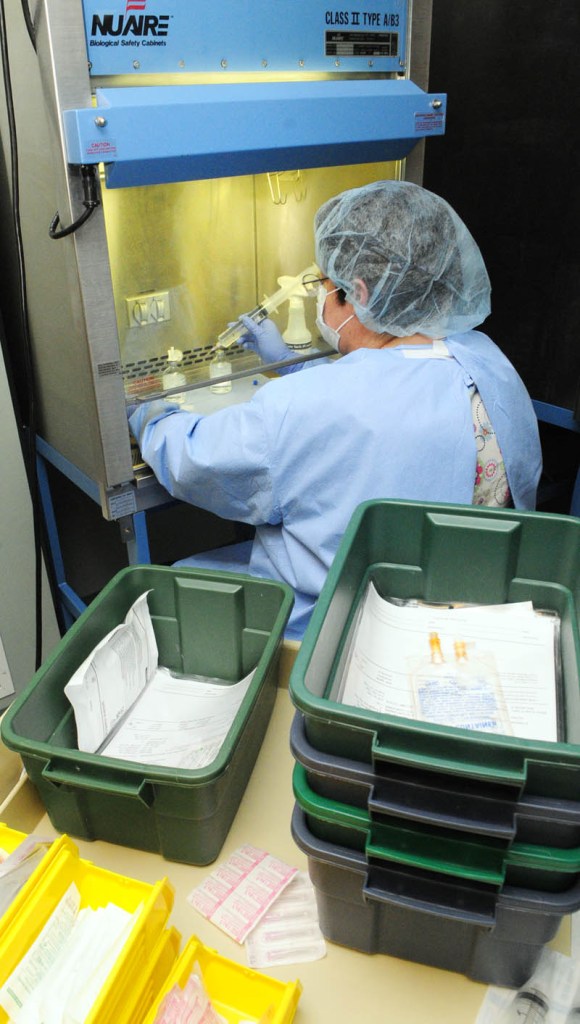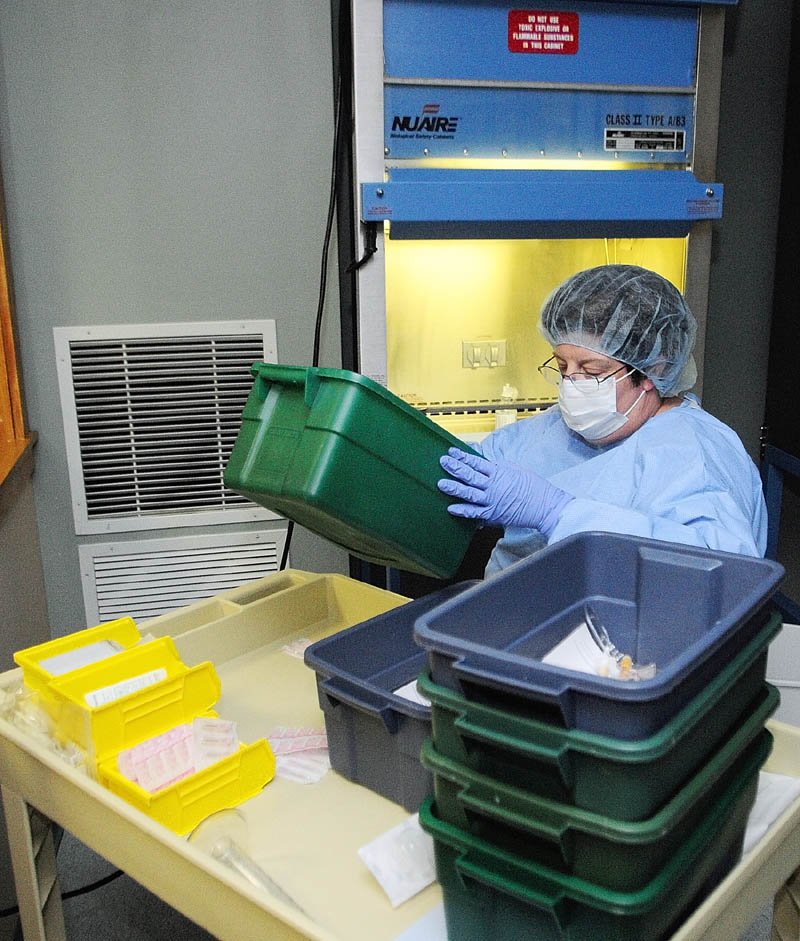AUGUSTA — The deaths of 53 people after a nationwide meningitis outbreak linked to a compounding pharmacy in Massachusetts has prompted a local lawmaker to put in a bill to strengthen regulations in Maine.
“We need to make sure what happened at that Massachusetts pharmacy could never happen in Maine,” said Rep. Sharon Anglin Treat, D-Hallowell. “One of the reasons we have these issues is we have no unified federal law to deal with compounding pharmacies.”
Treat, an attorney who works as executive director of the National Legislative Association on Prescription Drug Prices, said she began researching Maine law with regard to compounding pharmacies after the incident last fall at New England Compounding Center in Framingham. A contaminated steroid sent across the country from the pharmacy sparked a meningitis outbreak, killing 53 and sickening more than 700 in nearly 20 states.
No cases of illness or death were reported in Maine, according to the Centers for Disease Control and Prevention.
Since then, state lawmakers in more than 10 states have proposed tighter restrictions, according to the National Conference of State Legislatures. Treat’s bill would require all compounding pharmacies that fill prescriptions for those who live in Maine to be licensed by Maine, it creates a new type of license for compounding pharmacies, it removes two pharmacists from the state Board of Pharmacy and replaces them with a physician and a nurse, and it requires pharmacy board members to file an annual statement disclosing conflicts of interest.
In addition, L.D. 1315 requires the board to participate in a national data reporting system and institutes a $25,000 fine for out-of-state pharmacies that fail to comply with Maine’s rules.
Treat’s bill also calls for better public disclosure by requiring the board to post on its website all enforcement actions related to pharmacies, pharmacists and pharmacy technicians and information regarding pharmacy inspection results.
“There’s public disclosure to make sure members of the public can find out if there’s malpractice or malfeasance,” she said.
Kennebec Pharmacy & Home Care on Leighton Road in Augusta, one of the state’s handful of compounding pharmacies, fills both sterile and nonsterile prescriptions, General Manager Joe McVety said. Despite the ready availability of prescription drugs, compounding pharmacies still are needed to mix drugs for specific patients that address their particular needs, he said.
His pharmacy mixes creams and ointments and can make capsules without dyes that may be problematic for some patients, he said. They also make intravenous solutions for patients who need care at home. He estimates the pharmacy fills 15 compounded prescriptions a day.
On April 12, pharmacy technician Suzanne Goddard worked in the sterile laboratory, where she mixed chemotherapy drugs that would be administered by IV. The drugs would be used by a patient later that day or the following day.
McVety said the pharmacy is inspected once a year by the state and has received Home Care Services Accreditation, which is completed every three years. They send out samples of their products to be tested throughout the year and follow federal guidelines.
“There’s all kinds of regulations for us,” he said. “They have been looking at us and they will continue to look at us.”
Unlike what happened in Massachusetts, compounding pharmacies in Maine fill only specific prescriptions for individual patients. They do not produce compounds in mass quantities.
McVety said he’s not opposed to making improvements to the current system and probably will attend the public hearing on Treat’s bill to learn more about what she’s hoping to accomplish.
“Certainly we should be looking at our practice in the state of Maine,” he said. “As far as I know, we all have legitimate practices here.”
In addition to Treat’s bill, the Department of Professional and Financial Regulation, which oversees the pharmacy board, will be submitting proposed changes to state compounding rules to lawmakers. Doug Dunbar, a department spokesman, said the rules have not been finalized, but he indicated in an email that they will incorporate some existing federal standards and rules from the National Association of Boards of Pharmacy.
He said Maine does not have the type of compounding pharmacies that mass-produce drugs to be shipped elsewhere. There have been no complaints to the state Board of Pharmacy in recent years with regard to compounding pharmacies, he said.
“The places we’ve heard about, where the problems emanated from, we don’t have those here,” he said. “We have retail pharmacies that may on occasion compound on a per-prescription basis.”
Douglas Carr, a lobbyist for Rite-Aid, said Treat’s bill goes too far and is not likely to put in place the kinds of public health protections needed to prevent what happened in Massachusetts.
“We certainly are very mindful of the concerns and share concerns about what happened at New England Compounding Center in Massachusetts,” he said. “We’re not sure what she’s proposing would prevent that.”
In particular, Rite-Aid is concerned about Treat’s proposal to replace two of the five pharmacists on the board with a physician and a nurse. The seven-member board has five pharmacists and two public members. Carr said the board only rarely deals with compounding pharmacies.
“The pharmacists are experts in terms of drugs,” he said. “Ninety-nine percent of the time it is not going to be dealing with compounding.”
Joe Bruno, president of the Board of Pharmacy and a former Republican state lawmaker, called Treat’s bill “an overreach and an over-stretch.” He too disagrees with removing pharmacists from the board.
“It would be like putting a pharmacist on the plumbing board,” he said. “We haven’t had a problem here in Maine.”
Treat said she hopes members of the Labor, Commerce, Research and Economic Development Committee ask tough questions of state regulators during the public hearing on her bill, which is set for 9:30 a.m. Monday.
“Here at the state level, we can make sure the gaps are filled in and make sure we’ve done our due diligence,” she said.
Susan Cover — 621-5643
scover@mainetoday.com
Send questions/comments to the editors.







Comments are no longer available on this story